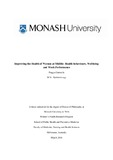Please use this identifier to cite or link to this item:
http://archive.nnl.gov.np:8080/handle/123456789/180Full metadata record
| DC Field | Value | Language |
|---|---|---|
| dc.contributor.author | Gartoulla, Pragya | |
| dc.date.accessioned | 2019-03-24T09:31:04Z | |
| dc.date.accessioned | 2020-08-21T07:26:17Z | - |
| dc.date.available | 2019-03-24T09:31:04Z | |
| dc.date.available | 2020-08-21T07:26:17Z | - |
| dc.date.issued | 2019-03-24 | |
| dc.identifier.uri | http://103.69.125.248:8080/xmlui/handle/123456789/180 | - |
| dc.description.abstract | Menopause is defined as the permanent cessation of menstrual cycles resulting from the depletion of ovarian follicles. Menopause is described as “natural” when due to biological ageing. Iatrogenic causes of early menopause include removal of both ovaries (surgical menopause), chemotherapy and radiotherapy. The major consequences of menopause are due to oestrogen deficiency and include: vasomotor symptoms (VMS, hot flushes and night sweats), urogenital atrophy (vaginal dryness, dyspareunia, and urinary tract infections), sleep disturbance, mood changes, and arthralgia. Some women are mildly symptomatic, whereas others can have debilitating symptoms. Little is known about the prevalence and severity of menopausal symptoms in Australian women, or how such symptoms are associated with women‟s wellbeing and work ability. | en_US |
| dc.language.iso | en | en_US |
| dc.subject | menstrual cycles resulting from the depletion of ovarian follicles. | en_US |
| dc.title | Improving the Health of Women at Midlife: Health behaviours, Wellbeing and Work Performance | en_US |
| dc.type | Thesis | en_US |
| Appears in Collections: | 300 Social sciences | |
Files in This Item:
| File | Description | Size | Format | |
|---|---|---|---|---|
| Pragya_thesis_PhD.pdf | 30.34 MB | Adobe PDF |  View/Open |
Items in DSpace are protected by copyright, with all rights reserved, unless otherwise indicated.